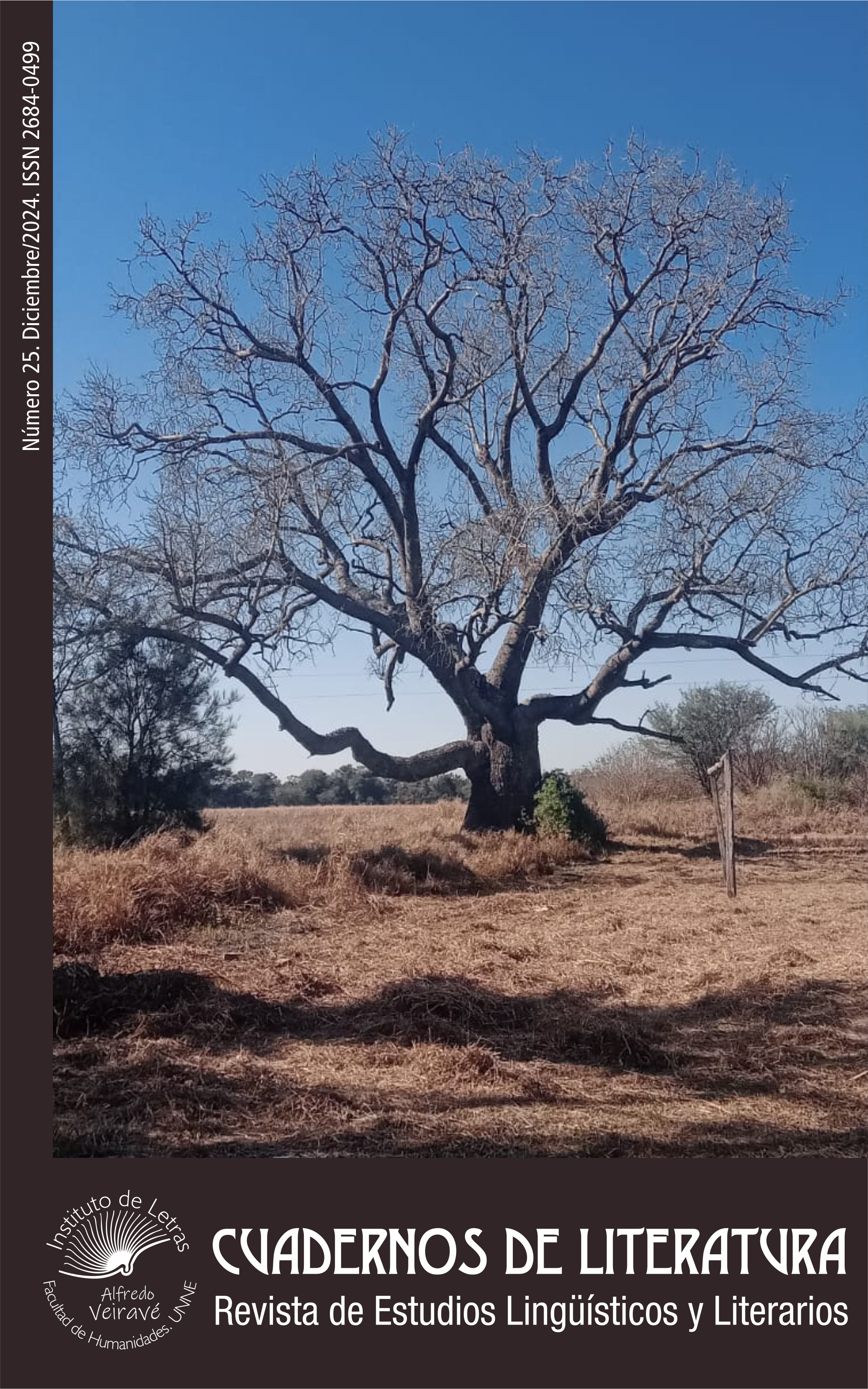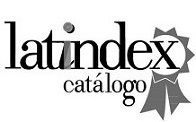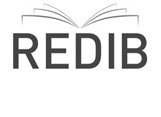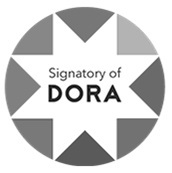Autoridades epistémicas en cuestión
Tentativas en torno a la figura del informante en la lingüística americana
DOI:
https://doi.org/10.30972/clt.257915Palabras clave:
Historia de la lingüística, Latinoamérica, informante, archivo, Rodolfo LenzResumen
El presente trabajo se propone ofrecer algunas coordenadas iniciales para un proyecto más amplio en torno al examen crítico de la figura del informante tal como la misma aparece en diversas instancias de la historia de la lingüística sobre todo en América del Sur, en un período que en principio abarca desde finales del siglo XIX hasta avanzado el siglo XX. La dinámica del lenguaje que se propone observar aquí es la de su construcción como objeto de conocimiento a través de la producción de un discurso autorizado por su condición de científico, que pugna por producir una representación sobre la realidad empírica de su objeto, que puede resultar a su vez en una intervención directa en el mismo, una vez más, como artefacto político producido discursivamente.
Citas
Allen, Harold B. (1971). Principles of Informant Selection. American Speech, 46(1/2), 47-51. https://doi.org/10.2307/3087986 DOI: https://doi.org/10.2307/3087986
Arnoux, Elvira Narvaja de. (2000). La Glotopolítica: transformaciones de un campo disciplinario. En Rubione, Alfredo (ed.), Lenguajes: teorías y prácticas (pp. 95-109). Buenos Aires, Instituto Superior del Profesorado “Joaquín V. González”.
Arnoux, Elvira Narvaja de. (2008). Los discursos sobre la nación y el lenguaje en la formación del Estado (Chile, 1842-1862). Estudio glotopolítico. Buenos Aires, Santiago Arcos.
Arnoux, Elvira y del Valle, José. (2010). Las representaciones ideológicas del lenguaje. Discurso glotopolítico y panhispanismo. Spanish in Context, 7(1), 1-24. https://acortar.link/Y8fXtu DOI: https://doi.org/10.1075/sic.7.1.01nar
Arnoux, Elvira, del Valle, José y Duchêne, Alexandre. (2019). Glottopolitique – glotopolítica: circulation, appropriation et expansion d’une lecture sociale du langage. Glottopol. Revue de sociolinguistique en ligne, 32, 2-6. https://acortar.link/5eDUnJ
Bauman, Richard y Briggs, Charles. (2003). Voices of Modernity. Language Ideologies and the Politics of Inequality. Cambridge y Nueva York, Cambridge University Press. DOI: https://doi.org/10.1017/CBO9780511486647
Blommaert, Jan. (2008). Artefactual ideologies and the textual production of African languages. Language & Communication, 28, 291-307. https://doi.org/10.1016/j.langcom.2008.02.003 DOI: https://doi.org/10.1016/j.langcom.2008.02.003
Blommaert, Jan. (2013). From fieldnotes to grammar: Artefactual ideologies of language and the micromethodology of linguistics. Tilburg Papers in Culture Studies, 84. https://acortar.link/rQpEUc
Caimari, Lila. (2017). La vida en el archivo. Goces, tedios y desvíos en el oficio de la historia. Buenos Aires, Siglo XXI.
Caimari, Lila. (2020). El Momento Archivos. Población & Sociedad, 27(2), 222-233. https://doi.org/10.19137/pys-2020-270210 DOI: https://doi.org/10.19137/pys-2020-270210
Canio Llanquinao, Margarita y Pozo Menares, Gabriel. (2013). Historia y conocimiento oral mapuche. Sobrevivientes de la “Campaña del desierto” y “Ocupación de la Araucanía” (1899-1926). Santiago de Chile, Lom Ediciones.
Castro-Gómez, Santiago y Grosfoguel, Ramón. (2007). Prólogo. Giro decolonial, teoría crítica y pensamiento heterárquico. En El giro decolonial: reflexiones para una diversidad epistémica más allá del capitalismo global (pp. 9-23). Bogotá, Siglo del Hombre Editores; Universidad Central, Instituto de Estudios Sociales Contemporáneos y Pontificia Universidad Javeriana, Instituto Pensar.
Coseriu, Eugenio. (1977). Tradición y novedad en la ciencia del lenguaje. Estudios de historia de la lingüística. Madrid, Gredos.
Del Valle, José (ed.). (2013). A political History of Spanish. The Making of a Language. Cambridge, Cambridge University Press. DOI: https://doi.org/10.1017/CBO9780511794339
Del Valle, José y Gabriel-Stheeman, Luis (eds.). (2002). The Battle over Spanish between 1800 and 2000. Language Ideologies and Hispanic Intellectuals. Londres y Nueva York, Routledge. DOI: https://doi.org/10.4324/9780203164860
Derrida, Jacques. (1996). Le Monolinguisme de l’autre, ou la prothèse d’origine. París, Gallilée.
Deumert, Ana y Storch, Anne. (2020). Introduction: Colonial Linguistics – Then and Now. En Deumert, Ana; Storch, Anne y Shepherd, Nick (eds.), Colonial and Decolonial Linguistics Knowledges and Epistemes (pp. 1-21). Oxford, Oxford University Press. DOI: https://doi.org/10.1093/oso/9780198793205.003.0001
Deumert, Ana; Storch, Anne y Shepherd, Nick (eds.). (2020). Colonial and Decolonial Linguistics Knowledges and Epistemes. Oxford, Oxford University Press. DOI: https://doi.org/10.1093/oso/9780198793205.001.0001
Dippie, Brian. (1991). The Vanishing American. White Attitudes and U.S. Indian Policies. Lawrence, University of Kansas Press.
Ennis, Juan. (2012). Rudolf Lenz en la encrucijada criolla. Signo y Seña, 22, 181-214. https://acortar.link/ugLRDW
Ennis, Juan. (2016a). Rodolfo Lenz: economías de la lengua y políticas de la lingüística. Boletín de Filología, LI(1), 117-145. https://acortar.link/UxjB5t DOI: https://doi.org/10.4067/S0718-93032016000100004
Ennis, Juan. (2016b). Los tiempos de la filología: una historia americana. Filología, 48, 9-29. https://acortar.link/x58rJM
Ennis, Juan. (2017). La materia prima de las lenguas modernas, o el oriente más próximo de la filología. Estudos de Lingüística Galega, 9, 49-64. https://doi.org/10.15304/elg.9.3736 DOI: https://doi.org/10.15304/elg.9.3736
Ennis, Juan. (2021). El papiamento. La lengua criolla de Curazao. La gramática más sencilla, de Rodolfo Lenz (1926). En del Valle, José, Lauría, Daniela, Oroño, Mariela y Rojas, Darío (eds.), Autorretrato de un idioma. Crestomatía glotopolítica del español (pp. 367-376). Madrid, Lengua de Trapo.
Ennis, Juan y Claudio Soltmann. (2021). Comunicación epistolar y colaboración científica entre especialistas alemanes en Sudamérica a fines del siglo XIX. Un estudio de la correspondencia entre Rodolfo Lenz y Robert Lehmann-Nitsche. Romanistisches Jahrbuch, 72(1), 311-338. https://doi.org/10.1515/roja-2021-0015 DOI: https://doi.org/10.1515/roja-2021-0015
Ennis, Juan y Claudio Soltmann. (2024). “El método filológico sigue siendo esencialmente el mismo, no importa cuál sea el material”. Acerca del epistolario entre Rodolfo Lenz y Franz Boas. Indiana, 41(1), 295-322. https://doi.org/10.18441/ind.v41i1.295-322
Errington, Joseph. (2008). Linguistics in a Colonial World. A Story of Language, Meaning and Power. Londres y Nueva York, Blackwell. DOI: https://doi.org/10.1002/9780470690765
Fabian, Johannes. (1983). Time and the Other: How Anthropology Makes Its Object. Nueva York, Columbia University Press.
Fernández Garay, Ana y Hernández, Graciela. (2006). Textos tehuelches (aonek'o ?a?jen). Homenaje a Jorge Suarez. Múnich, Lincom.
Fontanella de Weinberg, Beatriz. (1994). El español de América. Madrid, Mapfre.
Foote, Susan. (2005). Pascual Coña: testimonios de sobrevivientes. Acta Literaria, 30, 111-119. http://dx.doi.org/10.4067/S0717-68482005000100009 DOI: https://doi.org/10.4067/S0717-68482005000100009
Foucault, Michel (1966). Les Mots et les choses. Une archéologie des sciences humaines. París, Gallimard.
Gänger, Stefanie. (2014). Relics of the Past. The Collecting and Study of Pre-Columbian Antiquities in Peru and Chile 1837-1911. Oxford, Oxford University Press. DOI: https://doi.org/10.1093/acprof:osobl/9780199687695.001.0001
Gasel, Alejandro. (2021). Imágenes y escenas disensuales: los silencios de una informante. El Hilo De La Fábula, 22, e0010. https://acortar.link/vYiq68
Guitarte, Guillermo. (1962-2000). Guillermo L. Guitarte letters. Burns Library Archival Collections, Boston College.
Guitarte, Guillermo. (1965). Bosquejo histórico de la filología hispanoamericana, en El Simposio de Cartagena. Agosto de 1963. Informes y Comunicaciones (pp. 230-244). Bogotá, Instituto Caro y Cuervo.
Hale, Kenneth. (1965). On the use of informants in field-work. Canadian Journal of Linguistics/Revue canadienne de linguistique, 10(2-3), 108-119. https://doi.org/10.1017/S0008413100005582 DOI: https://doi.org/10.1017/S0008413100005582
Heller, Monica y McElhinny, Bonnie. (2017). Language, Capitalism, Colonialism. Towards a Critical History. Toronto, University of Toronto Press.
Hill, Ruth. (2009). Entre lo transatlántico y lo hemisférico. Los proyectos raciales de Andrés Bello. Revista Iberoamericana, LXXV(228), 719-735. https://doi.org/10.5195/reviberoamer.2009.6604 DOI: https://doi.org/10.5195/reviberoamer.2009.6604
Labov, William. (1972). Some principles of linguistic methodology. Language in Society, I, 97-120. https://acortar.link/3CQmgl DOI: https://doi.org/10.1017/S0047404500006576
Lenz, Rodolfo. (1894). Ensayos filológicos americanos I. Anales de la Universidad de Chile, 87, 113-132.
Lenz, Rodolfo. (1895-1897). Estudios araucanos. Materiales para el estudio de la lengua, la literatura i las costumbres de los indios mapuche o araucanos, diálogos en cuatro dialectos, cuentos populares, narraciones históricas i descriptivas i cantos de los indios de Chile en lengua mapuche, con traducción literal castellana. Santiago, Imprenta Cervantes.
Lenz, Rodolfo. (1911). Un grupo de consejas chilenas. Estudio de novelística comparada precedido de una introducción referente al orijen i la propagación de los cuentos populares. Anales de la Universidad de Chile, 129, 685-764 y 1339-1393; 130 (1912), 209-214 y 369-377.
Lenz, Rodolfo. (1912). Tradiciones e ideas de los araucanos acerca de los terremotos. Anales de la Universidad de Chile, 130, 753-771.
Lenz, Rodolfo. (1927). El papiamento. La lengua criolla de Curazao. La gramática más sencilla. Santiago, Imprenta y Litografía Balcells.
Lenz, Rodolfo y Barros Arana, Diego. (1893). La lingüística americana. Su historia y estado actual. Anales de la Universidad de Chile, 84, 985-1029. https://acortar.link/UqRXG8
Maldonado-Torres, Nelson y Cavooris, Robert. (2017). The Decolonial Turn. En Poblete, Juan (ed.). Latin American Studies. Culture and Power (pp. 111-127). Londres y Nueva York, Routledge. DOI: https://doi.org/10.4324/9781315158365-8
Mignolo, Walter. (1995). The Darker Side of Renaissance. Literacy, Territoriality and Colonization. Ann Arbor, University of Michigan Press.
Mignolo, Walter. (2000). Coloniality, Subaltern Knowledges, Border Thinking. Local Histories/Global Designs. Princeton, Princeton University Press.
Mücke, Johannes y Moreira de Sousa, Silvio. (2020). De Santiago de Chile a Graz, Austria: la correspondencia entre Rodolfo Lenz y Hugo Schuchardt. Boletín de Filología, 55(2), 205-252. https://acortar.link/t6RR2Q DOI: https://doi.org/10.4067/S0718-93032020000200205
Nassenstein, Nico; Hollington, Andrea y Storch, Anne. (2021). Linguistic Trash. Postcolonial Text, 16(2), 1-25. https://bit.ly/431EKRu
Pagel, Steve. (2021). El árbol y las olas: Hugo Schuchardt ante la clasificación lingüística del siglo XIX. Revista Argentina de Historiografía Lingüística, 13(1), 69-87. https://bit.ly/414hUWX
Pavez Ojeda, Jorge. (2015). Laboratorios etnográficos. Los archivos de la antropología en Chile (1880-1980). Santiago, Ediciones Universidad Alberto Hurtado.
Pratt, Mary Louise. (1992). Imperial Eyes. Travel Writing and Transculturation. Londres y Nueva York, Routledge. DOI: https://doi.org/10.4324/9780203163672
Rojas, Darío. (2024). Semblanzas. Rodolfo Lenz. Anuario de Glotopolítica, 6, https://bit.ly/3XanZ2P
Ruiz Figueroa, Fernando. (2020). Lenz y Manquilef: la creación de un sujeto étnico. Boletín de Filología, 55(2), 137-167. http://dx.doi.org/10.4067/S0718-93032020000200137 DOI: https://doi.org/10.4067/S0718-93032020000200137
Sánchez-Macedo, Jaime. (2020). El giro archivístico; su impacto en la investigación histórica. Humanitas, 47 (IV), 183-223. https://bit.ly/3ELGhBc
Schuchardt, Hugo. (2021 [1900]). Sobre la clasificación de los dialectos románicos. Lección de ensayo pronunciada en Leipzig el 30 de octubre de 1870. Revista Argentina de Historiografía Lingüística, 13(1), 89-98. http://bit.ly/4b7JMy0
Schütz, Günther. (1976). Correspondencia de Rufino José Cuervo con Rodolfo Lenz. Epistolario de Rufino José Cuervo con filólogos de Alemania, Austria y Suiza, 2 vols. Bogotá, Instituto Caro y Cuervo.
Tello, Andrés Maximiliano. (2018). Anarchivismo. Tecnologías políticas del archivo. Adrogué, La Cebra.
Descargas
Publicado
Versiones
- 2025-03-19 (2)
- 2025-03-18 (1)









52.jpg)









